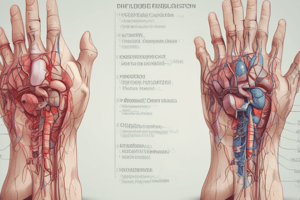Podcast
Questions and Answers
Which type of wound involves non-traumatic wounds with contaminated entry into a viscus, but with minimal spillage?
Which type of wound involves non-traumatic wounds with contaminated entry into a viscus, but with minimal spillage?
- Clean contaminated (correct)
- Clean
- Dirty
- Contaminated
What type of wound includes traumatic wounds or significant spillage from a viscus or acute inflammation?
What type of wound includes traumatic wounds or significant spillage from a viscus or acute inflammation?
- Contaminated (correct)
- Clean contaminated
- Dirty
- Clean
Which type of wound includes non-traumatic wounds with no septic focus and no viscus opened?
Which type of wound includes non-traumatic wounds with no septic focus and no viscus opened?
- Dirty
- Clean contaminated
- Contaminated
- Clean (correct)
What type of wound includes traumatic wounds from a dirty source or significant bacterial contamination or release of pus?
What type of wound includes traumatic wounds from a dirty source or significant bacterial contamination or release of pus?
Which of the following statements about viral endotoxin is true?
Which of the following statements about viral endotoxin is true?
How is injury-induced vascular leakage related to endothelial retractions?
How is injury-induced vascular leakage related to endothelial retractions?
What are the consequences of recurrent attacks of acute inflammation?
What are the consequences of recurrent attacks of acute inflammation?
How does streptococcal tonsillitis affect neutrophil count?
How does streptococcal tonsillitis affect neutrophil count?
Which cells have no capacity to regenerate?
Which cells have no capacity to regenerate?
What is granulation tissue composed of?
What is granulation tissue composed of?
Which stage of wound healing involves fibroblasts synthesizing collagen and causing wound contraction?
Which stage of wound healing involves fibroblasts synthesizing collagen and causing wound contraction?
What mediates wound contraction, reducing tissue defects and forming a scar?
What mediates wound contraction, reducing tissue defects and forming a scar?
Which cells are responsible for secreting collagen to form a scar?
Which cells are responsible for secreting collagen to form a scar?
What is the primary component involved in increasing wound strength during wound healing?
What is the primary component involved in increasing wound strength during wound healing?
Which factor does not affect wound healing?
Which factor does not affect wound healing?
What characterizes the initial stage of a scar?
What characterizes the initial stage of a scar?
In whom do scars take longer to settle and improve?
In whom do scars take longer to settle and improve?
What distinguishes keloid scars from hypertrophic scars?
What distinguishes keloid scars from hypertrophic scars?
What causes stretched scars?
What causes stretched scars?
What are adhesion scars?
What are adhesion scars?
When do scar contractures commonly occur?
When do scar contractures commonly occur?
What is the effect of infection on the scarring process?
What is the effect of infection on the scarring process?
What is a possible consequence of impaired arterial supply on wound healing?
What is a possible consequence of impaired arterial supply on wound healing?
How do metabolic disorders affect wound healing?
How do metabolic disorders affect wound healing?
Flashcards are hidden until you start studying
Study Notes
- Wound healing involves the reorientation and maturation of collagen fibers, increasing wound strength and leading to a flat, pale, slightly shiny scar. This process takes 3 weeks to 1 year.
- Wound healing can be affected by various factors, including impaired arterial supply or venous drainage (global or local), age of the patient, excessive movement or distension, infection, malignancy, foreign body, necrotic tissue, smoking, malnutrition, immunosuppression, anticancer therapies, and metabolic disorders.
- A scar is an area of fibrous connective tissue produced by healing. It is initially flat and pale, then becomes red, itchy, and raised before settling back to a flat, pale, slightly shiny patch. The scarring process is more pronounced if infection intervenes during healing or in the presence of foreign bodies.
- Children's scars take longer to settle and improve over 2-3 years, but they resolve rapidly in the elderly.
- Three types of abnormal scars exist: hypertrophic scars, which are firm, red, itchy, and elevated above the skin surface but within wound boundaries; keloid scars, which extend beyond wound boundaries and do not regress spontaneously; and stretched scars, which are caused by the dehiscence of the dermis under intact epidermis and are common on the back and abdomen.
- Adhesion scars are bands of scar tissue that bind normally unjoined tissue. They can appear as thin sheets of tissue or thick fibrous bands. Adhesions form when the dermis under the intact epidermis separates.
- Scar contractures are common on the flexor surfaces of joints. They occur when wounds heal by secondary intention, after split skin grafting, or when incisions cross a joint perpendicular to the crease.
Key facts from text:
- Wound healing involves the reorientation and maturation of collagen fibers, increasing wound strength.
- Wound healing can be affected by various factors like impaired arterial supply, age of patient, excessive movement, infection, and malnutrition.
- Scars are made of fibrous connective tissue produced during healing.
- Children's scars take longer to settle and improve.
- Three types of abnormal scars are hypertrophic, keloid, and stretched scars.
- Adhesion scars are bands of scar tissue that bind normally unjoined tissue.
- Scar contractures are common on the flexor surfaces of joints.
Studying That Suits You
Use AI to generate personalized quizzes and flashcards to suit your learning preferences.




